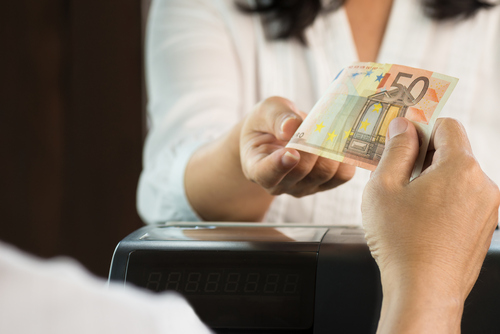L’argent liquide peut être une source de transmission du coronavirus
Dans un contexte marqué par l’épidémie de Covid-19, les paiements en espèces se font de plus en plus rares. Il y a quelques jours, l’Autorité bancaire européenne (ABE), conformément aux recommandations émises par l’OMS, a demandé aux autorités chargées des services de paiement dans chacun des pays de l’UE de faciliter le paiement sans contact.
De nombreuses études montrent que les billets en substrat de coton, représentant 90 % des billets dans le monde dont l’euro, sont réputés pour héberger davantage de bactéries que ceux en polymère adoptés par le Royaume-Uni, le Canada et l’Australie. Les banques centrales se montrent néanmoins rassurantes en indiquant que « la probabilité de contagion par un virus via un billet de banque est très faible ». En mars, l’OMS avait estimé la durée de vie d’un virus sur un billet à 2 heures maximum. Ce risque minime n’a toutefois pas empêché la Chine de désinfecter ses yuans grâce aux rayons ultra-violets.
Les professionnels de la santé rappellent quant à eux que l’application des gestes barrières est nécessaire pour éviter toute contamination. Ils conseillent de se laver les mains après avoir manipulé des espèces et d’éviter de se toucher le visage. L’utilisation du paiement sans contact peut également réduire le risque de transmission.
Les retraits d’espèces en très net recul
Le Syndicat national de la banque et du crédit a constaté un net recul des retraits en espèces la dernière semaine de mars. En effet, les retraits aux distributeurs ont chuté de 60 % par rapport à l’année dernière. Parallèlement, les paiements sans contact ont progressé de 4 % et jusqu’à 10 % en pharmacie. Au-delà de la peur d’attraper le virus, ces chiffres s’expliquent aussi par la mise en place du confinement qui contraint les Français à limiter leurs déplacements.
Plusieurs associations et notamment la Fédération nationale des associations tutélaires (FNAT) et l’Union nationale des associations familiales (UNAF) alertent sur la hausse du nombre de commerçants refusant les paiements en espèces précisant que 5 % des consommateurs ne disposent pas de carte de paiement ni de carte de retrait. En temps normal comme en temps de Covid-19, l’article R 642-3 du Code pénal s’applique et prévoit une amende de 150 euros à l’encontre du commerçant qui refuserait un paiement en pièces de monnaie ou en billets.
